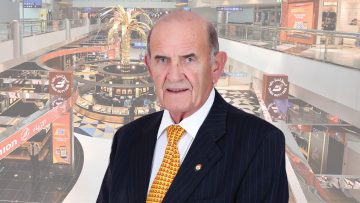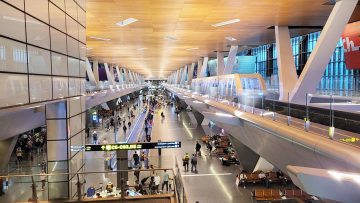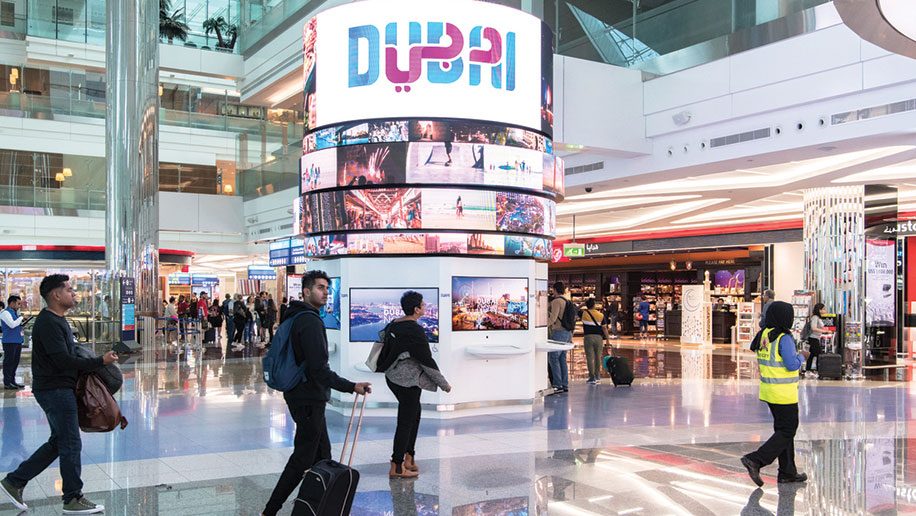
Boarding pass in hand, you’ve cleared security and still have an hour before you need to reach your departure gate. For many, it’s time best spent leisurely strolling through the airport’s duty free area, half-tempted to find out the price of an electronic gadget or a bottle of perfume. Travel retail is an integral and indispensable component of the air travel experience – and it’s a multi-billion-dollar business at that.
According to The Moodie Davitt Report, the world’s top travel retailer in 2022 was China Duty Free Group which recorded a turnover of €7.35 billion. The Swiss-based Dufry Group and South Korea’s Lotte Duty Free followed with turnovers of €6.98 billion and €4.36 billion respectively.
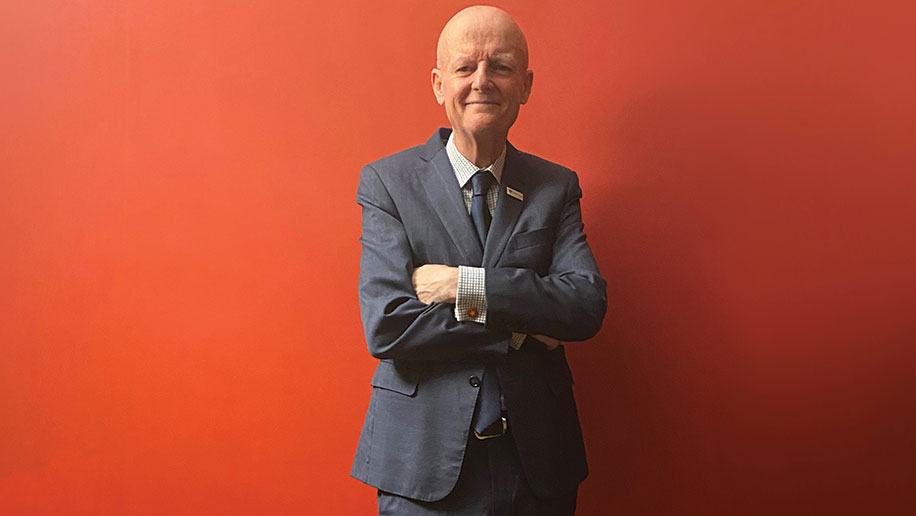
Within that same list, two prominent duty free operators from the Middle East made it into the top 20. Dubai Duty Free recorded sales of €1.63 billion and Qatar Duty Free witnessed a turnover of €797 million landing them at the 11th and 15th spots respectively. “If you look at the region’s major airport developments over recent years at airports in Abu Dhabi, Bahrain, Dubai, Doha, Muscat and Riyadh, you’ll see that retail is front of mind when these projects take shape, as opposed to the afterthought that it was in so many older airports worldwide,” Martin Moodie, founder and chairman of The Moodie Davitt Report told Business Traveller. “We are talking about some of the world’s greatest airports and outstanding retail theatres positioned within them. Despite the geo-political uncertainty, we consider prospects for duty free and travel retail very bright for the Middle East. That confidence is based on three key factors: projected strong passenger traffic growth, the development of outstanding new airport terminals and related infrastructure, and the growing retail professionalism of airports throughout the region.”
Moodie’s upbeat assessment of this region’s travel retail sector is backed by the sheer scale of some of its key offerings. Dubai Duty Free, for example, operates nearly 40,000 sqm of retail space across Dubai International and Al Maktoum International airports. Its 10-month sales have reached US$1.74 billion, 28.59 per cent higher than the corresponding period last year. “We are positive that we will meet our target by the year-end, which is in excess of US$2 billion,” says Colm McLoughlin, executive vice chairman and CEO of Dubai Duty Free.
McLoughlin notes perfumes, liquor, gold, cigarettes and tobacco, and electronics held on to the top five spots category-wise in the first ten months of this year at Dubai Duty Free. He says that perfume sales reached US$293 million, representing a 22.84 per cent increase, while sales of liquor were up by 14.96 per cent at US$249 million, gold sales increased by 24.59 per cent year-on-year with sales amounting to US$172 million and that of cigarettes and tobacco rose 36.02 per cent to US$168 million. Electronics came in fifth place with sales of US$138 million, an increase of 29.05 per cent year-on-year.
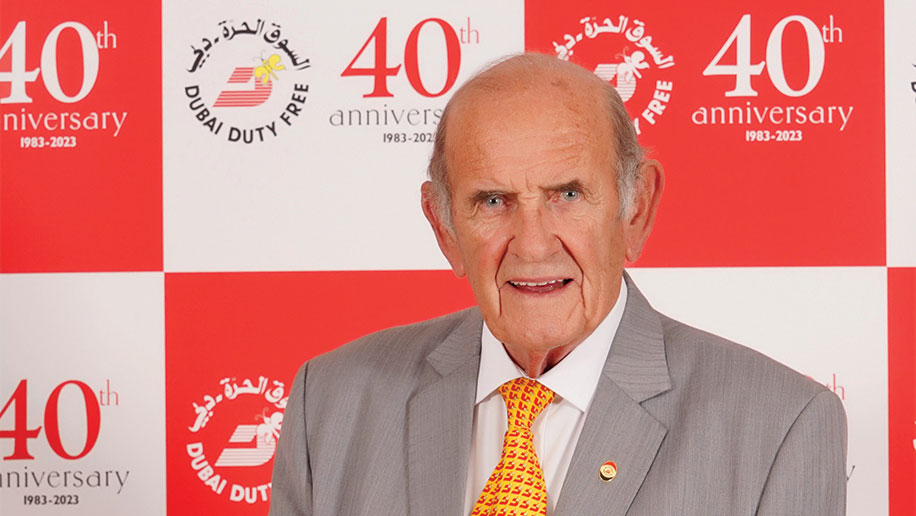
Ajay Sobhraj, founder and chairman of the Dubai-headquartered Au Finja, a prominent gold retailer at Dubai Duty Free, says that the sales of gold at duty free have recovered from its pandemic performance. “Dubai Duty Free achieved over US$170 million in gold sales in 2022. While the pandemic initially impacted tourism, the reopening of travel has led to increased footfalls in the Middle East and GCC regions, resulting in improved gold sales that have already surpassed pre-pandemic levels,” says Sobhraj. “The volume of the gold retail business has exceeded pre-pandemic levels by at least 15 per cent in the Middle East, while the demand for gold had surged by 38 per cent in 2022. The GCC region, particularly Saudi Arabia and the UAE, significantly contributed to these strong sales.”
Beyond Dubai, Abu Dhabi’s all-new Terminal A, which now serves as the home for UAE’s national carrier Etihad, began full-fledged operations last month. Terminal A has 35,000 sqm of retail and F&B space. Lagardère Travel Retail, by way of a joint venture between Lagardère Capital and Abu Dhabi Capital Group, became one of the largest concessionaires in the new terminal and opened 12 duty free and six F&B outlets at Abu Dhabi International. Exclusively for Terminal A, the retailer designed four concepts: Le Gourmet is a fine food store, Le Club and Little Le Club are built for enthusiasts of wines, champagnes, spirits, and tobacco which are sourced from all around the world, while Scent offers a global collection of fragrances and cosmetics.
Outside of the UAE, Doha’s Hamad International airport completed the first phase of its renovation ahead of the World Cup last year. At the time, Qatar Duty Free unveiled a brand-new offer at HIA’s newly expanded space with more than 65 retail and dining outlets spread across three levels. Qatar Duty Free has gone on to introduce several world firsts within that airport. These include the world’s only Louis Vuitton Lounge, the world’s first Thom Browne airport boutique, the world’s first permanent FIFA airport store and the only Fendi Café in an airport.
“If one looks at the two major airport openings of the past year or so – the Hamad International airport expansion and Abu Dhabi’s Terminal A – both have set new standards in terms of ambition and excellence for airport shopping. In terms of range, innovation and excellence, the retail offers here match anything that you will find in the local market worldwide,” says Moodie.
Over in Bahrain, Bahrain Duty Free Shop Complex posted a profit of US$9.8 million for the first nine months of 2023, which is a healthy 33.7 per cent jump year-on-year. Reportedly, fashion and accessories represent 15 per cent of sales within the 4,700 sqm space occupied by it at Bahrain International airport.
One of the most exciting potential markets for travel retail within the region lies in Saudi Arabia. Riyadh’s King Khalid International’s duty free stores are owned by the Lagardère Travel Retail-owned Aelia Duty Free. In 2022, duty free sales at the Riyadh airport climbed 51 per cent over 2019 as the kingdom dramatically opened to an increasing number of visitors with the relaxation of its visa entry rules. That momentum from 2022 carried over into 2023, as duty free sales for the first six months of this year at Riyadh airport increased 93 per cent compared to the same period in 2019 and was up 39 per cent over 2022.
Saudi Arabia is on the cusp of a further travel retail revolution. In April this year, Jeddah’s King Abdulaziz International airport issued a Request for Proposals for its duty free contract covering Terminal 1 and its North Terminal too. Within Saudi Arabia, duty free stores currently operate at King Abdulaziz International airport, King Khalid International, King Fahad International airport in Dammam and Prince Muhammad bin Abdulaziz airport in Madinah.
With a number of new airports, and major expansion projects of existing airports announced across the kingdom, including at Riyadh, The Red Sea, and Abha, Saudi Arabia has tremendous potential to further scale its duty free operations.
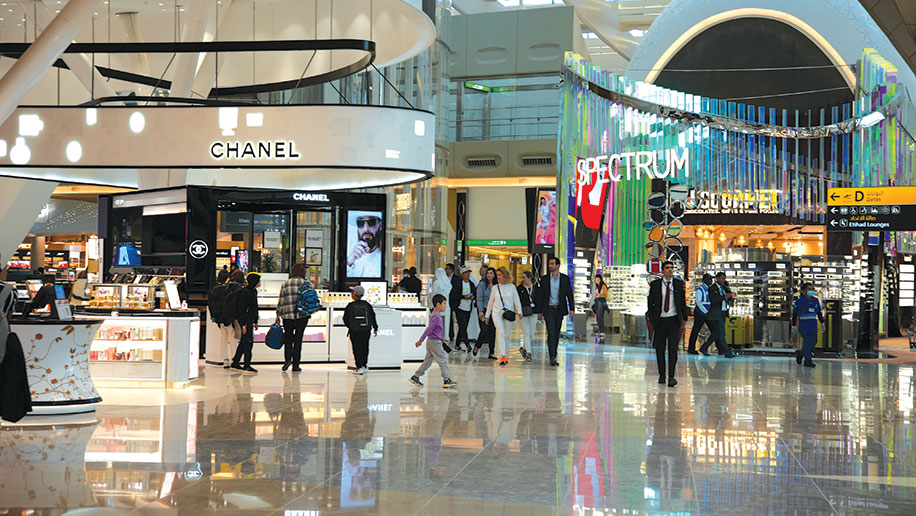
Evolving the travel retail business
For duty free operators globally, the major concern at the start of the pandemic was that the ensuing travel restrictions in China would mean a long-term downward trajectory in the spending of travellers from China. That concern has now been firmly alleviated for some operators within this region. “We have witnessed a substantial increase in travel spending from Chinese tourists since the reopening of outbound travel from China and relaxed travel restrictions in Asia,” says Dubai Duty Free’s McLoughlin. “Chinese customers travelling to and from China are now ranked number three in the top market sources for Dubai Duty Free, with gross sales of US$128 million for the ten months equivalent to over 600,000 transactions. In total, Chinese passengers now account for 7.21 per cent of the total spend at Dubai Duty Free.” McLoughlin adds that India continued to be the top source market for Dubai Duty Free this year, followed by Saudi Arabia, China, Russia and the UK.
Meanwhile, the demographic of the buyers visiting the duty free outlets and their purchasing habits are constantly evolving, often varying between specific categories too. Au Finja’s Sobhraj says, “The demographic of gold buyers at duty free shops reveals interesting trends. Middle-aged shoppers comprise the largest age purchasing segment, but millennials have shown significant growth from the pre-Covid period to 2021-22. The percentage of millennials purchasing in duty free shops increased by 7 per cent, reaching 22 per cent, while middle-aged shoppers grew by 6 per cent, making up 53 per cent.
“Gen Z shoppers also increased, doubling from 4 per cent in 2017-2020 to 8 per cent in 2021-22. In contrast, the percentage of seniors purchasing in duty free shops declined steeply, falling by 17 per cent from 2017-2020 to 2021-22. In terms of gender, male shoppers increased their purchasing behaviour by 7 per cent, reaching 64 per cent, while female shoppers saw a 7 per cent decline, decreasing to 36 per cent,” says Sobhraj.
Sobhraj has a number of suggestions as to how travel retail sales overall can be further enhanced including by enabling the delivery of products to the purchaser’s home address and also providing travel-exclusive products that are available only in a specific duty free location. Two more of his tips – linking duty free sales to airline frequent-flier programmes and exploring airline-airport partnerships to encourage travellers to shop at airports – are already being undertaken within the region. Emirates Skywards Miles can be redeemed at Dubai Duty Free, whereas Qatar Airways’ Avios points can be spent at Hamad International. Qatar Airways went one step further earlier this year when it introduced rules that allow members of its Privilege Club to be rewarded with their Avios points upon check in at Hamad International. These points are credited up to 120 minutes before their flight’s departure. The points earned for an upcoming flight can therefore be used by the travellers at almost 200 Qatar Duty Free outlets at Hamad International.
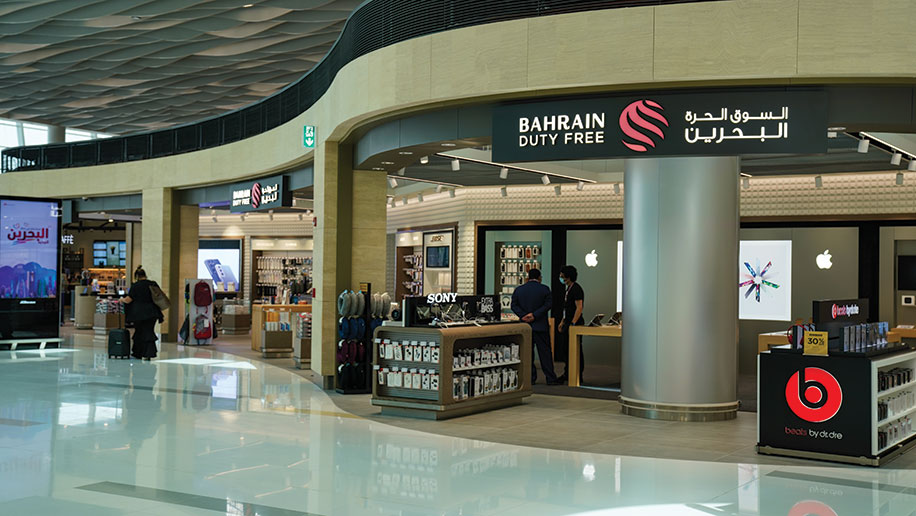
Similarly, this year, Oman Air signed a partnership with Muscat Duty Free to allow the airline’s Sindbad frequent flyer programme members to pay with their Miles when shopping through the retailer’s online store (while the products can then be picked up on arrival or departure from the airport).
Sinbad members can also earn Miles when shopping in-store, earning one Sindbad Mile per Omani Rial spent in departures, and two Sindbad Miles for every Omani Rial spent in arrivals.
Government regulations will also play a vital role in spurring the travel retail segment within the Middle East. Encouragingly, at the start of this year, Saudi’s Minister of Finance approved rules that would allow duty free shops to be set up at airport arrival zones.
Meanwhile, some duty free entities have widely diversified beyond just travel retail. Notable among them is Dubai Duty Free which celebrates its 40th anniversary this month. “We have an existing portfolio of other businesses under Dubai Duty Free Leisure Group. The Irish Village in Garhoud, continues to do well, as does the one in Studio One Hotel in Dubai Studio City. Likewise, the Century Village features seven licenced restaurants and complements The Irish Village on the other side of the stadium. Meanwhile, the Jumeirah Creekside Hotel has witnessed an increase in rooms reserved overnight this year, and as the official hotel for the Dubai Duty Free Tennis Championships, it has done a fantastic job hosting the players and officials during this year’s tournament.
“In addition to being the home of the Dubai Duty Free Tennis Championships, the Dubai Duty Free Stadium continues to host several concerts,” says McLoughlin.
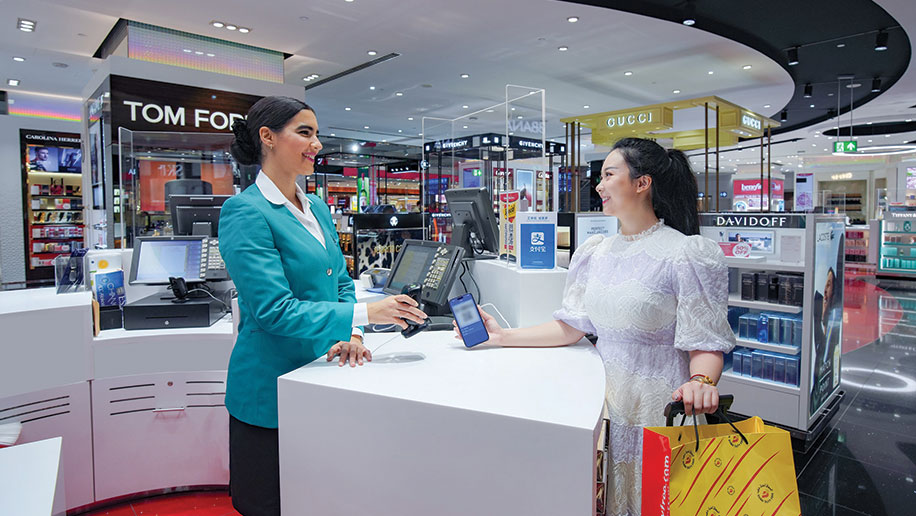
McLoughlin reveals that Dubai Duty Free is all set to further expand its operations. He explains, “We are now working on major refurbishment projects in most of our major retail spaces, including the refurbishment of liquor and tobacco shops in Concourse B, with February 2024 being the completion date for its final phase. Dubai Duty Free is also working on the preliminary work in preparation for the scheduled renovations of the three arrival shops in the first quarter of 2024. Dubai Duty Free is expecting the site work to start in early 2024, and the construction will continue until the second to third quarter of 2024. Concourse A (perfumes and cosmetics shops, including fashion) will also be refurbished starting in the second quarter of 2024 and will be finished in early- to mid-2025 with three new boutiques of major brands. The watches and electronics shops in Concourse B are also lined up for a refurbishment next year.”
As they grow their travel retail operations, what then can the Middle East’s leading duty free operators learn from their global counterparts? Moodie, says that it is very likely the other way around. He says, “I would contend that the leading Middle East travel retailers – along with some of their Asian counterparts – have actually been the world leaders in terms of retail innovation and best practices. A retailer such as Dubai Duty Free, for example, is renowned for the sheer diversity of its offer, which enables it to reach out to all travelling consumers, not just luxury shoppers. Dubai Duty Free has always prided itself on that democracy of its offer – everything from Tang to Tiffany, Nido to Nintendo – and not surprisingly its conversion rates (passengers to shoppers) are among the highest in the airport world.”









